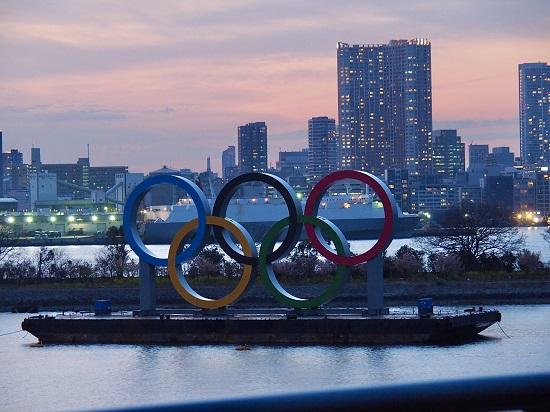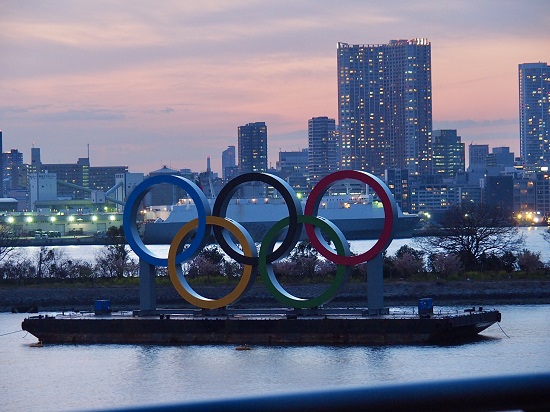

Having just closed out a bizarre year in sports, everyone was ready to take a break from disruptions. Settle down a bit. Try to get back to normal.
Well, everyone except a politician in Florida, apparently.
Last week, Florida’s chief financial officer sent an open letter to Thomas Bach (yes, that Thomas Bach), with the proposal that the Olympics in Tokyo be relocated to Florida. This summer. In less than six months.
In his letter, CFO Jimmy Patronis noted, “With media reports of leaders in Japan “privately” concluding that they are too concerned about the pandemic for the 2021 Olympics to take place, there is still time to deploy a site selection team to Florida to meet with statewide and local officials on holding the Olympics in the Sunshine State. I would welcome the opportunity to pitch Florida and help you make the right contacts to get this done.”
Patronis went on to note, “The State of Florida has successfully allowed sports to take place during the pandemic,” and cited examples like UFC and the NBA bubble. He also pointed to the Disney theme parks as “an incredible model for how to run a complex organization in the midst of COVID-19.”
The Sun-Sentinel newspaper of Florida noted, “Patronis, the state’s top fiscal officer, hasn’t supplied a plan for paying for the Olympic Games, which is costing Japan at least $15.4 billion.”
The proposition went over just about as well as you’d expect – and perhaps the only positive to come out of it was the reignition of the debate over Olympic sites, in light of the problems with finding cities to host. As the world was shaking its collective head at Patronis’ suggestion, others were floating (again) the concept of having permanent rotating sites for the Games. The idea, which periodically surfaces (often in situations like this – and more recently when problems leading up to the Games in Rio made headlines) is back with a vengeance right now.
An editorial in The Conversation suggested there be one permanent home for the Olympics.
“With a central venue, the International Olympic Committee (IOC) can in one masterstroke confirm its rightful place as the epicenter of global sporting excellence and underscore the ideals of the Olympiad where peace and social justice can be promoted through a common global language of sport,” the article reads. “The time has come to dump the piecemeal reforms and decide on a permanent venue for our flagship tournament; it would centralize control over events and even the training of the athletes.”
It was certainly not the first time this has been suggested. In the last decade, a vocal minority has become louder and louder, espousing the creation of a standardized set of locations for large sports events.
“It is time for sports to stop victimizing our cities. If holding big events in the same place every time is good enough for tennis and golf, it’s good enough for American football and the Olympics,” noted Alex Pareene in Salon.
And in fact, while cities once rushed the IOC to offer to host the Games, these days, bids are less numerous as more destinations take into account the large-scale cost and disruption the Games will cause.
Some points in favor of one specific site:
Security: One site means fewer variables when it comes to security, with a trained force of professionals whose only job it was to keep the event secure.
Creation of a Bubble: Having all athletes, journalists, officials and spectators in one place would allow for stricter control of the potential for disease.
Atmosphere: Following concerns over the cleanliness of Rio’s air and water, the selection of one venue would allow the IOC to choose a place without environmental threats (or at least with fewer threats).
Competition Venues: A permanent site for the Olympics could mean being always ready to host – and new venues could be added as new sports were added.
Less Doping: Oh, this is a tricky one for sure. But The Conversation says that a permanent site could keep doping at these sports events under control: “A single site would allow for tighter controls over performance enhancement, and more efficient and environmentally friendly delivery of Olympic Games competitions. There would be no reliance on diverse national approaches to each. It would also allow the IOC to more easily limit protests and maintain a safe environment for participation, rather than attempting to insert a massive logistical intrusion into one of the world’s major cities.
Of course, there’s also a number of drawbacks, including: if the event(s) are hosted in a specific country (or countries) over and over, those countries are going to be picking up a sizeable tab each time. Not all economies are ready for that. And if something untoward should happen to the designated host country – political unrest, war, a terror attack, a pandemic, etc. – where could the event be held instead?
It's not a perfect scenario. But Florida’s suggestion has, if nothing else, started the conversation again. And this time, more people may be listening.
Florida, says The Sports Examiner, is not exactly a prime example of a destination for the Games, noting, “Never mind that Florida as a state has had 1.66 million reported cases of the coronavirus and 25,445 deaths compared to 368,143 cases for all of Japan (and 5,193 deaths). But credit Patronis for grabbing a headline and looking out for more tourism for his state.”
In recent months, Florida has indeed become the place to go for international sports, with the World Golf Championship-Mexico moving to the Sunshine State rather than its original destination of Mexico City. Additionally, the Mexican Olympic softball team announced plans to spend some time training in Florida before heading to Tokyo. And let’s not forget that Tampa hosts the Super Bowl in another week. It has also become a go-to destination for youth sports as other states tightened restrictions.
And make no mistake – prior to the pandemic, Florida was a top tourism destination. But it isn’t likely that the IOC will be moving the Games to the U.S., much less to a state that has never hosted an Olympics, nor one that doesn’t have the infrastructure in place, including designated athlete housing (although Patronis insists the state’s hotels will do just fine, he apparently has not considered the number of officials, coaches, media and spectators that would also require housing). And while Patronis is correct in that the state does have college sports venues, those are unsuitable in every way for international competition.
Additionally, Bach and local organizers said as recently as two weeks ago that they are focused on the summer games opening in Japan on July 23.
The New York Post notes that the Japanese government has called reports that it is canceling the games “categorically untrue.”
And the IOC? Let’s just say Patronis’ announcement didn't get much recognition. According to Inside The Games, Patronis’ offer drew comparisons to a similar suggestion made by London Mayoral candidate Shaun Bailey last year. (Tokyo Governor Yuriko Koike criticized what he called an "inappropriate" offer from Bailey last February, after Baily claimed London could "step up" as host).
And closer to home, the announcement found the USOPC trying to do damage control. Inside The Games noted the USOPC said, "We were not made aware of the letter to President Bach in advance. We invite American cities to indicate to us their interest in hosting a future Olympic and Paralympic Games, and we are happy to work with them through the education and fact-finding process. We stand in support of the Tokyo Organizing Committee and Japanese government who have given more than seven years of focus and dedication to welcoming the athletes of the world and honor their efforts to host a safe and successful Games this summer."
The IOC itself referenced a statement issues that the committee is “committed to the successful delivery of the Olympic and Paralympic Games Tokyo 2020 this year.”
The Huffington Post pulled absolutely zero punches, quoting Victor Matheson, an economist at Holy Cross and an expert on the economic impact of the Olympics, who said Patronis’ proposal was “bat---- crazy.”
“The idea that just because Florida has a lot of hotels that they could organize an entire Olympics event within six months is absolutely crazy,” Matheson said. He further noted that Florida currently does not have a venue that could fit an Olympic-size track, nor does it have a natatorium that could hold 10,000 people. And Andrew Zimbalist of Smith College, another economist who has studied the political and economic costs of hosting the Olympic games (and a contributor to SDM), said there’s “zero chance” the IOC will take Patronis’ request seriously.
“It’s bonkers,” Zimbalist said. “Tokyo and Japan have spent about $35 billion to be able to host the games and they’re not going to walk away from that.” He also noted that Florida’s hot and humid weather conditions in July and August could pose a risk to athlete safety. (There are, after all, marathons and other endurance events to be conducted – and those are run outdoors).
“This is an idiotic, delusional, uninformed, ignorant Florida politician trying to put his name out there,” Zimbalist said of Patronis. “And whether or not he himself believes this can be done, I don’t know. It’s got no chance. It’s just stupid.”
If, by making the announcement, Patronis wished to catapult himself to national prominence as Florida’s champion, he has certainly succeeded. In light of the response, it is unlikely to be a positive reflection, however, and his office did not immediately respond to a request for comment.
The White House also declined to comment.

